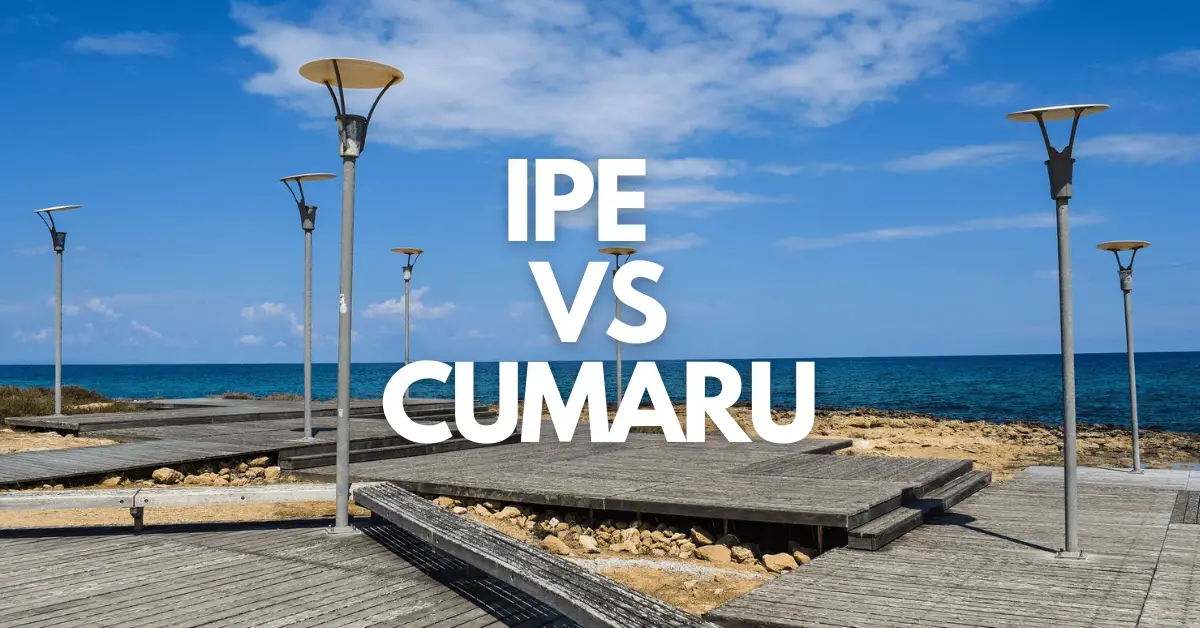Ipe wood is harder, dense, and more stable than Cumaru wood. Ipe wood is more popular and widely used for making decks and fences.
Cumaru wood is a versatile wood and is a strong competitor to Ipe. Most people get confused about choosing Cumaru and Ipe to build the deck because their characteristics are very similar to each other.
Ipe wood
Ipe wood is an extremely hard, durable, and rot-resistant hardwood that is native to Central and South America. Wood has a dark brown color which makes it an attractive option for high-end furniture and other wood products.
Ipe wood is also known as Brazilian Walnut, Lapacho. It is a sustainable and eco-friendly wood that is widely used for decking, fences, and outdoor furniture.
Cumaru Wood
Cumaru wood is an extremely stiff, durable, decay-resistant hardwood that is native to northern South America. Wood contains silica which makes it naturally rot-resistant.
Cumaru wood is commonly known as Brazilian Teak, It is a hardwood that is used for furniture, flooring, and other objects. It is sustainable and readily available.
Difference between Ipe and Cumaru wood
| # | Ipe wood | Cumaru Wood |
| Scientific name: | Handroanthus spp. (formerly placed in the Tabebuia genus) | Dipteryx odorata |
| Average Dried Weight: | 69 lbs/ft3 (1,100 kg/m3) | 68 lbs/ft3 (1,085 kg/m3) |
| Janka Hardness: | 3,510 lbf (15,620 N) | 3,330 lbf (14,800 N) |
| Crushing Strength: | 13,600 lbf/in2 (93.8 MPa) | 13,850 lbf/in2 (95.5 MPa) |
| Elastic Modulus: | 3,200,000 lbf/in2 (22.07 GPa) | 3,237,000 lbf/in2 (22.33 GPa) |
| Shrinkage: | Radial: 5.9%, Tangential: 7.2%, Volumetric: 12.4%, T/R Ratio: 1.2 | Radial: 5.3%, Tangential: 7.7%, Volumetric: 12.6%, T/R Ratio: 1.5 |
Uses
Ipe wood is one of the most excellent choices for making decks, fences, exterior furniture, tool handles, and other turned objects.
Cumaru wood is often used for cabinetry, furniture, flooring, heavy construction, docks, tool handles, and other small structures.
Since both Ipe and Cumaru are rated as very durable regarding decay resistance, therefore they can be used for outdoor purposes. They are incredibly scratch and dent-resistant, so they are widely used for flooring.
Ipe or Cumaru: Which wood is best for decking?
Ipe wood is a more acceptable wood for decks than Cumaru wood because Ipe wood is more durable, rigid, and compatible with outdoor use. It is the highest quality material for decking construction and It is easily available at a moderate price.
Cumaru is also a great choice for the deck but if Ipe is an option then people prefer to choose Ipe decking. Both kinds of wood have a remarkable natural resistance to decay and rot; it does not require sealing.
Which wood is easier to work with?
Both kinds of wood are difficult to work with because they are extremely hard and dense, as well as because they have interlocked and irregular grain patterns.
Keep your tools sharp when working on both of these woods as the grain can often tear-out on the interlocked areas.
If you’re looking to stain Ipe or Cumaru, they will take the stain extremely well and provide a high-gloss finish. Generally, they do not need to be stained, but staining prolongs the life of the wood.
How hard is Ipe and Cumaru?
The Janka hardness of ipe wood is 3,510 lbf (15,620 N) and the Janka hardness of Cumaru is 3,330 lbf (14,800 N).
Here are the Janka hardness ratings of other popular wood types compared to Ipe and Cumaru wood to get an idea about how hard they are.
| Wood Species | Janka Hardness |
| Desert Ironwood | 3,260 lbf (14,500 N) |
| Cumaru (Brazilian Teak) | 3,330 lbf (14,800 N) |
| Kingwood | 3,340 lbf (14,900 N) |
| Ipe wood | 3,510 lbf (15,620 N) |
| Patagonian Rosewood (Curupay) | 3,630 lbf (16,150 N) |
| African Blackwood | 3,670 lbf (16,320 N) |
| Snakewood | 3,800 lbf (16,900 N) |
| Quebracho | 4,570 lbf (20,340 N) |
Wood color and grain
The heartwood of Ipe wood is reddish brown to darker blackish brown, sometimes dark brown/black stripes are present on the ipe and the heartwood of Cumaru wood tends to be a medium to dark brown. Generally, Ipe wood is darker than Cumaru wood.
Ipe and Cumaru wood tends to turn gray due to constant exposure to weather and UV rays. In order to preserve the natural color longer, the surface of the wood needs to be UV-finished. Both kinds of wood have irregular or interlocked grain with fine to medium textures.
Is Cumaru a good alternative to Ipe?
Yes, Cumaru wood can be a great alternative to Ipe wood because the characteristics of Cumaru is very similar to Ipe. Both the wood is hard, sustainable, and naturally rot resistant. Many woodworkers consider Cumaru to be a new decking material.
Price and availability
Cumaru wood is cheaper than Ipe wood, sometimes the cost of Cumaru wood can be 40 to 50% cheaper than Ipe wood. Both kinds of wood are sustainable and readily available in the market.


